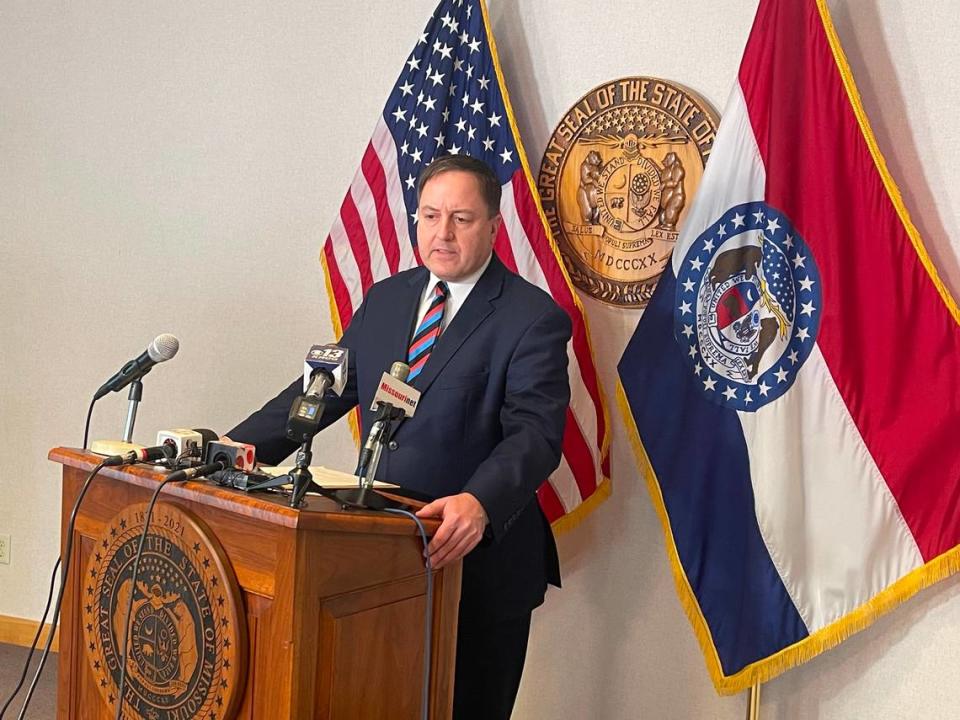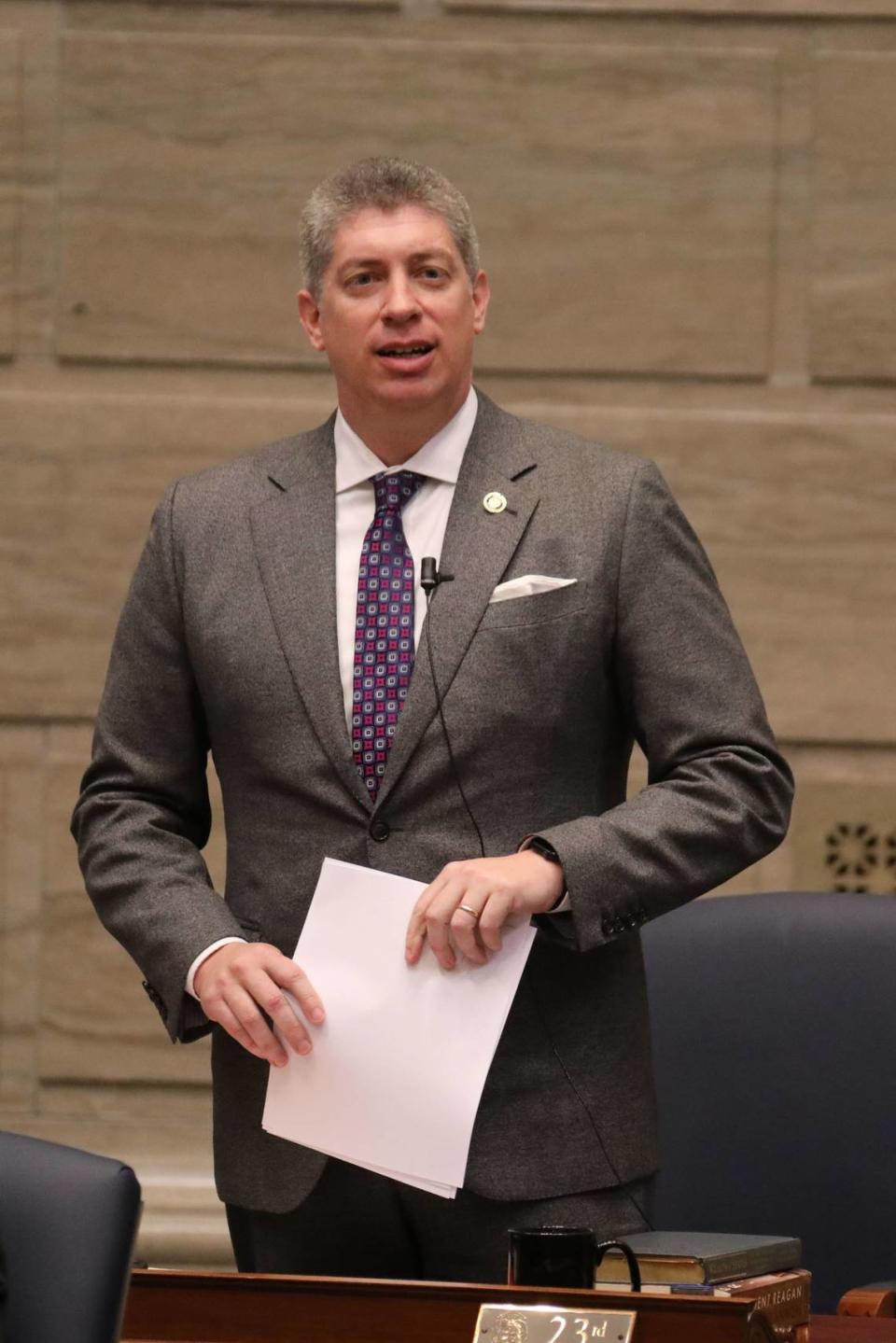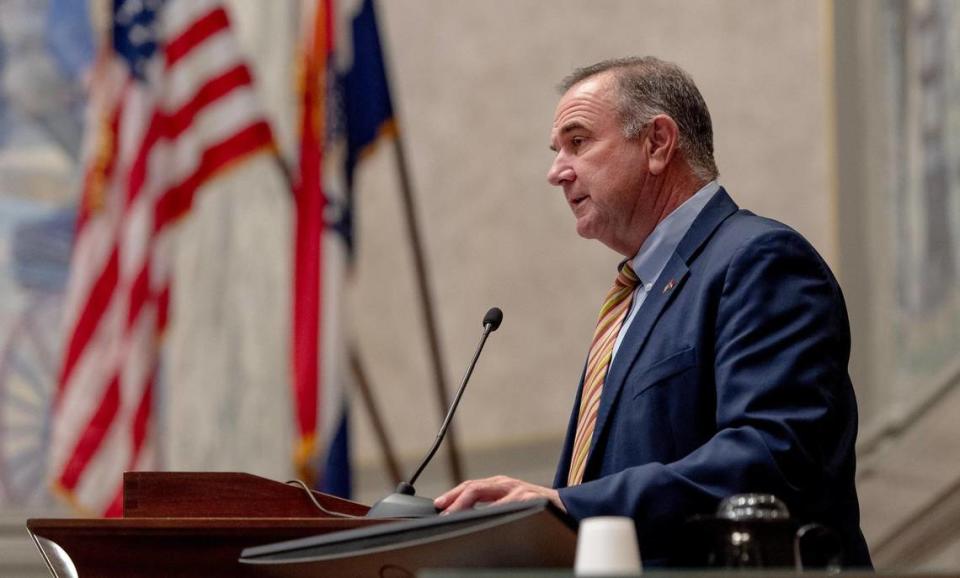Missouri Republican candidates want to end income tax, raising fears of Kansas-like woes
- Oops!Something went wrong.Please try again later.
- Oops!Something went wrong.Please try again later.
Every major Missouri Republican candidate for governor says they want to eliminate state income taxes, an ambitious stance that Democrats warn risks a budget disaster similar to what Kansas experienced a decade ago.
Missouri Secretary of State Jay Ashcroft and Sen. Bill Eigel of Weldon Spring both include calls to end the state income tax in their platforms. And Lt. Gov. Mike Kehoe’s campaign said he would prioritize ending the income tax.
Eigel, a member of the hard-right Freedom Caucus in the Missouri Senate, also supports eliminating personal property taxes, while Ashcroft wants to repeal a recent gas tax increase. All three Republicans are fighting for position ahead of the August primary election.
Missouri collects roughly $10 billion a year in personal and corporate income taxes that support the state’s general revenue – making the revenue a key component in funding state government.
Eliminating the state income tax – whether gradually or at once – would require a monumental shift in Missouri, causing lawmakers to confront potentially excruciating and politically difficult choices about the role and scope of government. Fewer than a dozen states lack an income tax.
A sudden end to the income tax would force Missouri officials to make dramatic reductions in spending, significantly raise the sales tax and other kinds of taxes to compensate, or pursue some combination of those options. Even a more gradual reduction would likely also require tough decisions, though potentially not as quickly.
Ashcroft and Eigel both say they are prepared for a budget reckoning, indicating in interviews they would take steps to control spending. Kehoe’s campaign also said he would seek to control spending.
Republicans often campaign on reducing or eliminating taxes, and it’s no surprise that GOP candidates in the 2024 race are raising the issue. But the focus on ending the income tax altogether – as opposed to only embracing further rate cuts – is a strong signal that a new Republican governor would aggressively push the legislature to cut taxes, even if lawmakers ultimately fall short of approving a total income tax elimination.
While ending the income tax would require the Republican-controlled General Assembly to pass legislation, the governor has wide latitude to prevent or slow spending by making line-item vetoes to the state budget or withholding funds already budgeted.
“We don’t have a revenue problem, we have a spending problem,” Ashcroft said.

Missouri’s total spending has grown from about $26.4 billion in the 2019 fiscal year to $38.2 billion in 2023. But much of that growth represents one-time federal pandemic aid that is rapidly being spent down. The growth in general revenue spending has been much smaller over the same time period, from about $9.5 billion to $12.5 billion.
Eigel said that he supports spending on education, veterans services, support for elderly and residents with disabilities, and law enforcement. But, he added, “there’s a lot of things that are going to be on the table as far as being ready (to be made) more efficient and a few cuts to the size and scope of government.”
Kehoe campaign spokesperson Michael Hafner said in a statement that as governor, “Kehoe will make it a priority to eliminate the income tax altogether and control state spending.”
A ‘shot of adrenaline’ for Missouri?
Democrats are watching the Republican jockeying over ending the income tax with frustration and fear.
In Kansas, then-Gov. Sam Brownback, a Republican, signed into law in 2012 and 2013 a package of tax cuts that he hailed at the time as “a shot of adrenaline” into the state economy. The cuts to the state’s income tax rates, along with a tax exemption for income from limited liability companies, led to significant budget shortfalls by 2014.
In 2015, Kansas lawmakers raised the state sales tax rate to help balance the budget. Statewide anger over the budget mess led to the election of a wave of moderate Republican and Democratic lawmakers the next year. And in 2017, the Kansas Legislature largely rolled back Brownback’s signature tax cuts over his objections.
“Missouri families need help and we should be focused on giving everyday folks more of their hard earned dollars, not more to the wealthy elites,” Missouri House Minority Leader Crystal Quade, a Springfield Democrat running for governor, said in a statement.
“We should be eliminating the grocery tax and providing tax credits to help cover the outrageous cost of child and elder care, not repeating the failed policies of Sam Brownback that defunded Kansas public schools.”
Mike Hamra, a Springfield businessman who is also campaigning for governor as a Democrat, said in a statement that Brownback, along with the anti-tax activist Grover Norquist, “pulled this political stunt” in Kansas a decade ago with “disastrous results that our neighbors are still trying to recover from, including a budget crisis, schools closing weeks early, multiple credit downgrades, and slowed economic growth.”
Hamra, who hasn’t yet officially filed as a candidate, said that anyone who would consider replicating what Kansas did “does not have Missourians’ best interest at heart.”
Asked about the Kansas experience, Ashcroft and Eigel both faulted the failure of politicians in Kansas to cut enough spending as they cut taxes. “You didn’t have any commitment from the Kansas Legislature over there to actually cut all the waste out of their government,” Eigel said.

Ashcroft acknowledged that Missouri is unlikely to end the state income tax at once. Instead, he has promised to create a task force that would make recommendations on how to replace lost revenue. He has indicated he plans to appoint both Norquist, president of Americans for Tax Reform, and the economist Arthur Laffer to the panel.
“I want to make sure as governor we statutorily put it up so there’s our goal and we’re going to hit it and no matter what we do we’re going to tick down to it,” Ashcroft said.
For its part, Kehoe’s campaign said the lieutenant governor – who it said voted for tax cuts valued at $2.5 billion as a state senator – is already working with Laffer. “Mike is actively working with conservative economist Dr. Art Laffer on a plan to lower the tax burden on Missourians,” Hafner said.

Laffer helped advise Brownback on the creation of the Kansas tax plan. More recently, Laffer in 2022 met with Missouri Republican Gov. Mike Parson, who called a special session on taxes that fall.
During that session, the General Assembly passed a bill that lowered the top state income tax rate from 5.3% to 4.95% in 2023. The top state income tax rate applies to Missourians who make roughly $22,000 or more a year.
The bill, signed by Parson, also mandated that if Missouri experiences revenue growth, the rate would drop to 4.5% when the plan is fully implemented in five years. Parson said it was the largest income tax cut in Missouri history.
Surplus fueled by federal funds
Given that lawmakers have a major income tax reduction they can already point to, even some Republicans may be hesitant to push further.
Sen. Lincoln Hough, a Springfield Republican who is running for lieutenant governor, said the cut was taken in a measured, responsible and conservative way. Hough, who chairs the Senate Appropriations Committee, said that has allowed Missouri to avoid massive pressure on state services.
“It’s easy for folks to say we should eliminate all taxes, but you got to remember those are the same folks who come to my office as the appropriations chair and say, ‘we need X, Y and Z in our district,’” Hough said.
While Missouri has budget reserves at the moment – the state’s surplus reached a likely peak of $8 billion last year – that historically hasn’t been the case, Hough said.
“This quote-unquote surplus that we have right now is sort of an anomaly because of the federal money that’s been coming in the last couple of years,” he said, alluding to federal pandemic aid.
Missouri already has a relatively low tax burden compared to other states, according to data from the Missouri Budget Project, a nonprofit that analyzes tax and budget policy. Missouri ranks 45th among states in the amount of state revenue it collects per person and 43rd in the amount it spends per person, a figure that includes federal funds.
By contrast, Illinois and Kansas are both in the top 20 when it comes to state tax revenue per person.
“What I see over and over again from these ludicrous proposals is that they really are the Brownback experiment on steroids,” said Rep. Maggie Nurrenbern, a Kansas City Democrat who is running for state Senate.
“And quite frankly, we shouldn’t replicate what Kansas did. We saw how that failed – really a colossal failure.”

